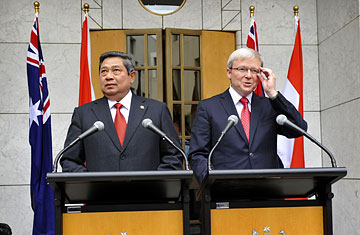
Indonesian President Susilo Bambang Yudhoyono, left, looks on as Australian Prime Minister Kevin Rudd speaks during a press conference at Parliament House in Canberra on March 10, 2010
On March 9, three terrorist suspects were killed by Indonesian police during a raid in Jakarta. Forensic experts carefully examined their bodies but kept their conclusions from the public until the following day, when, in a landmark address to the Australian parliament, Indonesian President Susilo Bambang Yudhoyono announced that one of the dead was Dulmatin, the alleged mastermind of the 2002 Bali bombings. It was a matter close to his host's heart: The top bomb-technician, who had a $10 million bounty on his head, set off bombs that killed 202 people on the Indoneisan holiday isle, 88 of them Australians.
Yudhoyono's speech was greeted with applause from the audience in the Canberra government, and the office of Prime Minister Kevin Rudd called Yudhoyono's address — he is the first Indonesian leader to speak before the Australian parliament in its 109-year history — a "milestone" for bilateral ties. But it was not the only grand gesture exchanged between the neighboring nations during his three-day visit to Australia this week. The Indonesian president was also awarded the Honorary Companion of the Order of Australia, the highest civilian honor in Australia, for encouraging democracy and economic ties between the two countries. (Other recipients of the prize include Mother Teresa and Nelson Mandela.)
While the relationship between Indonesia and Australia has improved dramatically since Australia's intervention in East Timor in 1999, even Yudhoyono admitted this week that it's still one of "love-hate." Since the 2002 Bali bombings, Australian travelers to Indonesia now receive a travel warning which Indonesia says promotes an overly negative image of the country. In 2006 several Australian drug smugglers — dubbed the Bali Nine — were sentenced to life imprisonment after being caught planning to smuggle heroin from Bali to Australia. Three are currently on death row in Indonesia. The next year, an Australian coroner ruled that the killings of the Balibo Five, five journalists — including two Australians, who were murdered in Indonesia in 1975 — were committed deliberately by Indonesian special force soldiers. A war-crimes investigation was launched into their deaths by the Australian Federal Police last September , and if the inquiry finds the deaths to be to be war crimes, it could trigger another rift in relations, as one of the military commanders at the time of the murders is now an Indonesian MP.
This week's summit, however, was largely dominated by another issue high on Rudd's list of priorities: people smuggling. Indonesia has become a hub for asylum seekers from Sri Lanka and Afghanistan looking to make the perilous journey to Australia by boat. Twenty-three vessels, many piloted by Indonesian fishermen, have been intercepted in Australian waters this year, an increasing number of illegal arrivals that has become a fire-hot domestic issue that could hurt Rudd's popularity during an election year. Yudhoyono announced during his visit that people-smuggling would now be punishable with a five-year sentence in Indonesia, and a new agreement to combat the practice was signed. The two leaders also announced increased collaboration in other areas, including fighting terror and transnational crime, and will hold annual meetings between MP's to maintain relations. The two countries made no leeway on a free trade agreement, which was discussed during Yudhoyono's visit.
Rudd seemed pleased with the course of the dialogue, but Yudhoyono warned there were still issues the neighbors needed to iron out. "There are Australians who still see Indonesia as an authoritarian country or a military dictatorship or as a hotbed of Islamic extremism, or even as an expansionist power," the Indonesian president said in his address. In a latter speech, he tersely criticized Australia's enduring travel warning to Indonesia: "We only know that Indonesia is now one of the top 10 tourist destinations for Australia, in spite of your government's advice against traveling to Indonesia."
Hugh White, a professor at the Australian National University and aVisiting Fellowat the Lowy Institute for International Policy, says SBY's warnings could further sow the seeds of distrust in Indonesia, and that Rudd lacks political courage when dealing with Indonesia. "Anyone that thinks the most important relationship between Indonesia and Australia is people smuggling has vastly overestimated how important people smuggling is, and vastly underestimated how important Indonesia is," says White. Instead, White believes that Australia should demonstrate more engagement with Indonesia's economy, the third fastest growing in Asia, as well as their strategic position in the South East Asian region. "Rudd doesn't seem interested in how far the country has come in the last ten years and how far it will continue to grow. We see it as a big country, but a weak country... Indonesia is actually a very strong country, that's vital to Australia's future," says White. "Our attitude needs to change dramatically."
